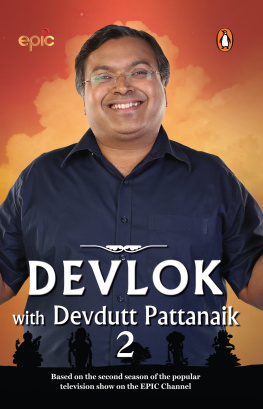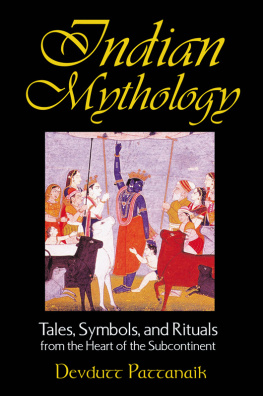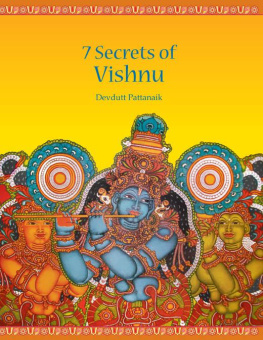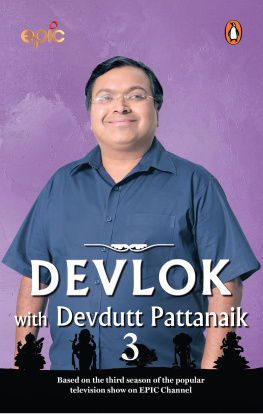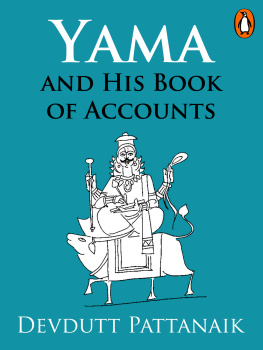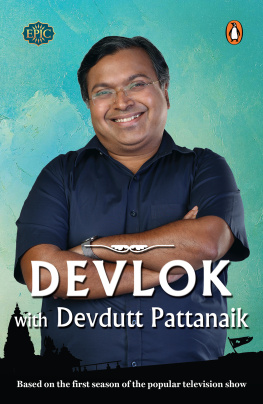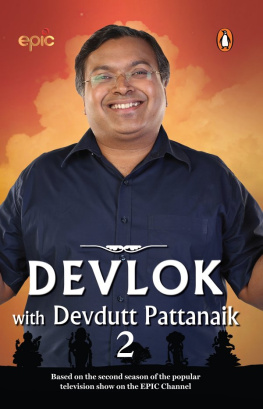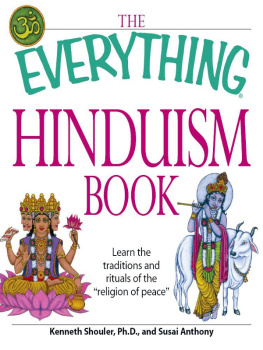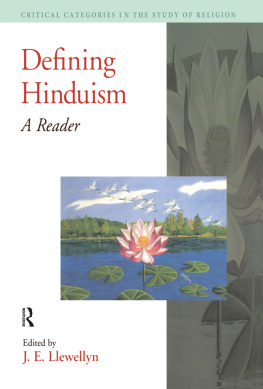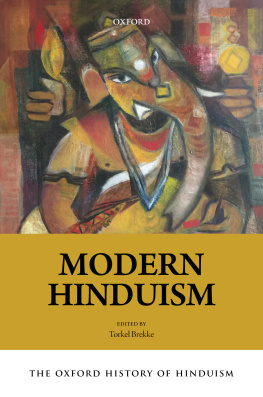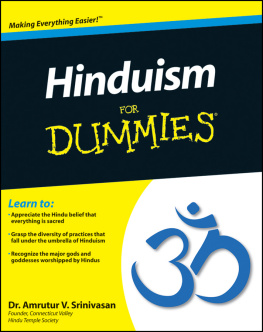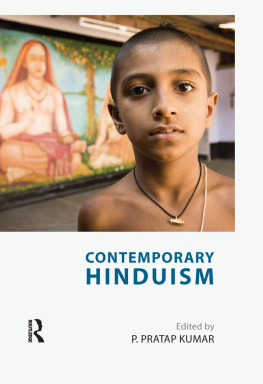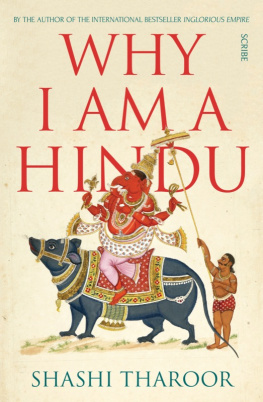Table of Contents
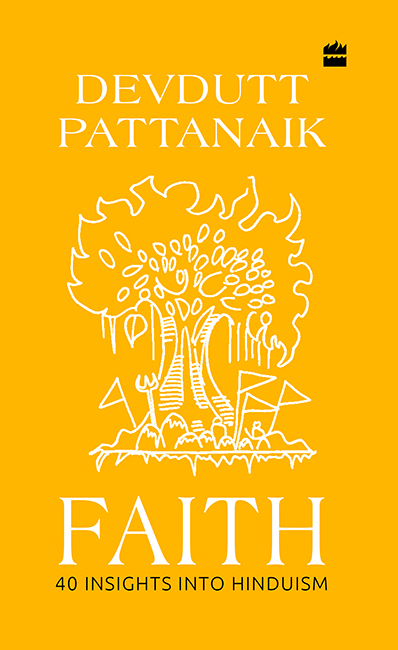
FAITH
40 INSIGHTS INTO HINDUISM
Devdutt Pattanaik
Illustrations by the author

Contents
T here are two reasons for this book. One relates to the past, the other to the future.
First, the reason related to the past: Many Hindus find it difficult to explain the origins, and hence the logic, of Hindu customs and beliefs, even to their own children. Not surprising, as it is not as organized a religion as Islam or Christianity. It becomes even more difficult when any questions about Hinduism are received with hostility. Matters become worse when the answers are dismissed, and Hindus are branded as defensive, apologetic, even chauvinistic. It does not help that the global village functions using Western humanistic or social justice frameworks that owe their origin to Western religions (where God is judge on Judgement Day) despite claiming to be secular. That is why they are at dissonance with Eastern thought, especially Hinduism (where God is no judge and there is no concept of Judgement Day). Hence this book.
Second, the reason related to the future: Hindus need to outgrow their tendency to locate pure Hinduism to a time, or to a geography, or to a scripture. This usually results in fundamentalism. In a global village, as people migrate to different lands and mingle with different people, we need to view Hinduism with a more forward-looking gaze, in terms of transformation: fruits more than roots. Hinduism practiced in a village in India cannot be the same as that practiced in an Indian city, or in an American, European, Australian, African or Chinese neighbourhood. Reframing and realignment are needed to make it relevant to contemporary space and time. We must remember how Hindu sages who wrote the dharma-shastras always advised adapting rules to time (kala), place (sthana) and people (patra). The idea of one truth that is finite, absolute, universal and equally relevant to all is not a Hindu idea. Empathy for diversity, of gods and of truths and of interpretations, is the key to gaining insight into Hinduism.
Faith answers questions about Hinduism with love and dignity. It provides as many facts as possible, but is ultimately based on my personal understanding, years of study and comparing Hindu with world mythology. Mythology reveals cultural truths, encoded in stories, symbols and rituals. As you go through the book keep in mind that nature is diverse, culture is dynamic, and our mind that transmits, and receives ideas, has its limitations. Dont seek perfection. Dont seek destination. Seek tendencies, drifts and directions, because:
Within infinite myths lies an eternal truth
Who sees it all?
Varuna has but a thousand eyes
Indra, a hundred
You and I, only two.
Devdutt Pattanaik


A lthough words like Vedic and Hindu are used interchangeably, technically speaking, the Vedic period is pre-Buddhist and over 3000 years old while Hinduism as we know it today took concrete shape around 2000 years ago when the Ramayana, Mahabharata and Puranas reached their final forms, along with the dharma-shastras, artha-shastras, kama-shastras and moksha-shastras. Bhakti peaked only 1000 years ago. Throughout, however, there were some ideas that were consistent. But can we call these ideas values?
The concept of universal values, which we find in the corporate world too, comes to us from Abrahamic mythology, where the God of Abraham puts down a set of rules and values (commandments) about how humans are supposed to conduct their lives. These rules and values are transmitted by messengers known as prophets. They are meant for all humans, for Abrahamic mythology believes everyone is equal before God and hence his rules and values apply equally to all. However, few people agree on what the correct set of rules and values are. This disagreement leads to fights between Jews, Muslims and Christians. They dont even agree if the day of rest should be Saturday, Friday or Sunday.
Secular nation states simply replace God with We, the People or the State and use the same Abrahamic model of governance based on rules/values that everyone is supposed to follow.
The Vedic worldview is very different. It is based not on rules or values, rather on the evolution of the mind. Here, nature (prakriti) came first, before culture (sanskriti). It functions as per the law of jungle where might is right, only the fit survive, and so driven by hunger and fear animals establish food chains, pecking orders and territories. Humans beings are animals with imagination. We have the ability to not subscribe to this jungle way. We can help the helpless. We can provide resources to help the unfit survive. We dont have to form packs, or herds. We dont have to dominate others or be territorial. This is dharma. When we dont do that, when we are not in line with our potential, we are following adharma. Humans have the ability to think of others (para-atma) and so can reach the infinite divine (param-atma) beyond the self (jiva-atma). When we do that, we are in line with our potential. We are evolving.
As we study the transformation of Hinduism over 3000 years, from Vedic to Puranic times, we notice an obsession with concepts such as infinity (ananta), diversity (aneka), and impermanence (anitya). This establishes a worldview that is the very opposite of Abrahamic thought which seeks to fix the world by rules and values. In the Hindu world everyones context is different. Everyones needs, wants, hungers and fears are different. All values and rules change with space (sthana), time (kala) and people (patra). Since Abrahamic mythology values equality, it values homogeneity over heterogeneity. Hindu mythology values diversity, and so appreciates that there cannot be one set of rules/values in a plural world. Also Hindu mythology factors in dynamism the idea that everything changes over time.
That is why in the Ramayana we have a rule-following hero (Ram) and a rule-breaking villain (Ravana), and in the Mahabharata we have a rule-breaking hero (Krishna) and a rule-following villain (Duryodhana). The problem is not rules/values. The problem is not obedience or disobedience. The problem is the animal within that refuses to rise to its human potential of empathy.
In the Vedic worldview, the focus is not on rules and values and obedience and punishment. The focus is on dharma, on engaging with others with awareness and working towards reducing our own hunger and fear. High hunger and fear nourish ego (aham), and takes us away from divinity (atma). When humans seek to dominate and control other people for self-aggrandizement, it is aham at work. When we enable people to empathize with each other, and seek to delight, rather than defeat and control others, then atma is at work. Rules and values are just hygiene.
In the end, the question becomes: does one work only for self (jiva-atma) or is one concerned about the other (para-atma)? Ram and Krishna work for others, Ravana and Duryodhana work for the self. We are all in between, hopefully moving towards dharma and atma (Ram/Krishna).
We can say that while the Abrahamic religions of the world and secular society value policies to improve the world, Hinduism values psychological evolution, and empathy instead. This can be exasperating to the impatient. But then what is the hurry? The world is limitless and this is but one of our many lives, as per Hinduism.


